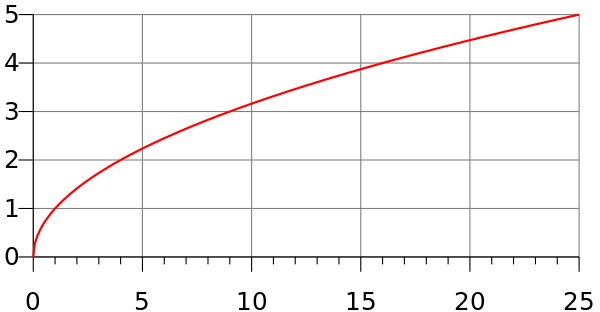sharathnair14
sampad
I think in GMAT sqrt(any number), always gives positive value. So i dont think E is the correct answer. It should be D.
Nope. I don't think so. Please check with the experts here to clarify!
a is a variable - It could a negative number or a positive.
\(\sqrt{a^2}\) can have three values -> -a, 0, and a.
\(\sqrt{a^2}=|a|\). The absolute value cannot be negative so \(\sqrt{a^2} \geq 0\).
When a < 0, then \(\sqrt{a^2}=|a|=-a=-negative=positive\).
When a > 0, then \(\sqrt{a^2}=|a|=a=positive\).
When a = 0, then \(\sqrt{a^2}=0=nonnegative\).
Generally, the square root function CANNOT produce negative result. EVER.
\(\sqrt{...}\) is the square root sign, a function (called the principal square root function), which cannot give negative result. So, this sign (\(\sqrt{...}\)) always means non-negative square root.
 The graph of the function f(x) = √x
The graph of the function f(x) = √xNotice that it's defined for non-negative numbers and is producing non-negative results.
TO SUMMARIZE:
When the GMAT provides the square root sign for an even root, such as a square root, fourth root, etc. then the only accepted answer is the non-negative root. That is:
\(\sqrt{9} = 3\), NOT +3 or -3;
\(\sqrt[4]{16} = 2\), NOT +2 or -2;
Notice that in contrast, the equation \(x^2 = 9\) has TWO solutions, +3 and -3. Because \(x^2 = 9\) means that \(x =-\sqrt{9}=-3\) or \(x=\sqrt{9}=3\).

 85%
(hard)
85%
(hard)
 69%
(00:52)
wrong
69%
(00:52)
wrong  based on 85
sessions
based on 85
sessions